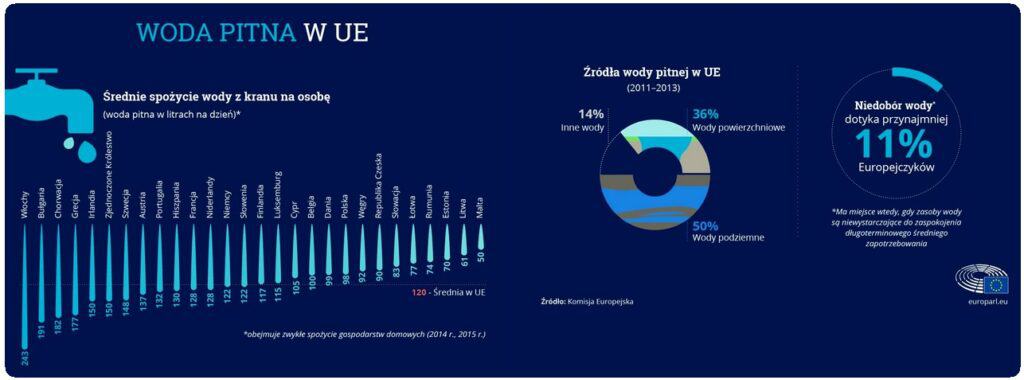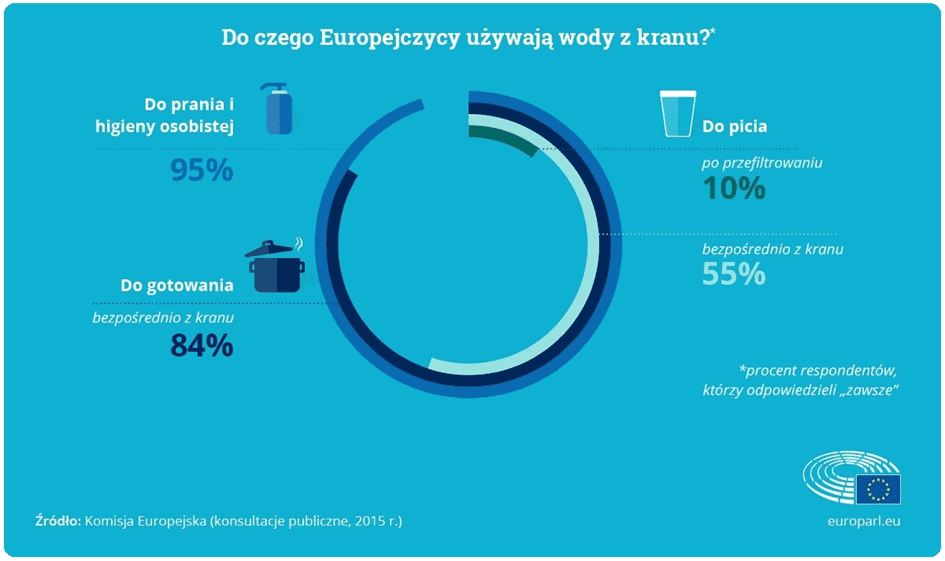At the end of 2020, MEPs passed new legislation to further improve the quality of drinking water, access to it by all citizens and reduce waste from plastic water bottles. According to the new legislation, tap water is simply to be of better quality, free of contaminants and bacteria, and therefore drinkable straight from the tap. It is also part of a strategy to reduce the purchase of water in plastic containers and thus improve the environment. Drinking water is to be not only better, but also publicly available in public spaces, which is the responsibility of the Member States. Read the rest of the article to find out more about the new legislation and who will be obliged to implement it: the city, the water utility, the municipality and the timeframe for implementation.
Don't have time to read?
Watch our short video, from which you will quickly learn more about the latest directive.
New EU directive on quality and access to drinking water comes into force
On 15 December 2020, the European Parliament adopted a new directive on the quality of water intended for human consumption during its plenary session. The directive came into force 12 days after its publication in the EU Journal, i.e. in January 2021. From then on, member states have 24 months to transpose the directive's provisions into local law. The Directive contains many challenges in terms of coordinating multiple ministries, so member states have already taken steps to organise cooperation between the administrations responsible for health, environment, agriculture, home affairs.
EU drinking water quality standards
Most people in the European Union have good access to high quality drinking water. More than 98.5 % of drinking water samples tested between 2011 and 2013 met EU standards. The new legislation is expected to increase consumer confidence in drinking tap water, which is much cheaper and better for the environment than bottled water. Member States should ensure access to it in public spaces. This is one element of a strategy to reduce the plastic that enters the environment.

The forthcoming EU Drinking Water Directive establishes minimum quality standards for water intended for human consumption: drinking, cooking and other domestic purposes to protect us from contaminants and bacteria. The new legislation reduces maximum limits for certain contaminants, such as lead, polyfluoroalkyl substances (PFAS), harmful bacteria and endocrine disruptors, and establishes new parameters for monitoring microplastics.
Free access to water in public places
Tap water is cheap and environmentally friendly. To enable and encourage people to drink tap water instead of bottled water, the quality of tap water will be improved by imposing stricter limits on certain contaminants, including lead. According to the new legislation, Member States should ensure universal access to clean water and improve access to water in cities and public places. One solution to this task is to install water drinkers, springs, dispensers or drinking water stations wherever this is technically possible and useful. Water from these facilities would be free of charge. The use of such solutions would take place in parks, town squares, offices, airports or shopping malls. The new legislation is also intended to ensure that tap water is available for free or for a small fee in restaurants, eateries and the provision of catering services.

Who is responsible for implementing the new rules?
At the moment, it is not yet known who will be ultimately responsible for bringing cities and municipalities into line with the new regulations. In Poland, it is likely that the act introducing the new regulations will mainly be the Act on collective water supply and the Regulation of the Minister of Health on the quality of water intended for human consumption. Once these have been drafted, we will know whether this obligation will fall on the water supply companies, the local government or the government. But the fact is that it is already worth thinking about the matter and jointly choosing the best solutions in this regard. The Union naturally assumes a transitional period for adapting to the new regulations, but these are not far-reaching deadlines. The set time for implementation is: 12.12.2023 r. Already now, local authorities and water utilities are looking for the best solutions to conveniently and safely provide access to drinking water in the areas of their cities and municipalities.

Spas are the best and proven solutions
Zdrojownia is a leader on the Polish market in the distribution of spas, stations and drinking water springs for both outdoor and indoor use. We have the widest selection, the most interesting and proven solutions - safe, ecological and economical. We offer both modern and retro-style sprinklers that blend in perfectly with the architecture of old markets and townhouses. For offices, waiting rooms, etc., we offer beautifully styled, top-quality devices that not only supply tap water, but also cool, gas or heat it. Contact us and together we will choose the best solution for you and your city!
Want to find out even more - read our information brochure (click on image below).









